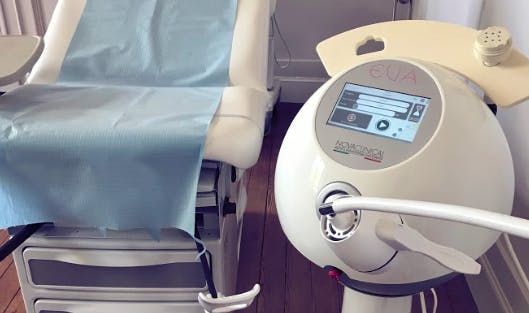Dr. Hichem Bensmail, as a pioneer in the use of this technology, will be running a Vaginal Rejuvenation Masterclass taking place 3th - 4th October, 2019 at Clinique Georges V, Bordeaux. In this 2 day course Dr. Bensmail will cover how to use this innovative technique to treat vaginal disorders.
INVIVOX: Why did you decide to organize this Masterclass?
Dr. Hichem BENSMAIL: I have around ten years of experience in functional gynecology. I was one of the first to use CO2 laser, hyaluronic acid, radio-frequency. This discipline has evolved a lot, both in terms of the materials we use and the techniques. I am also developing new techniques especially some combined therapies from radio-frequency and pharmaceutical products. For example: radio-frequency + PRP or radio-frequency + peeling. These are new approaches and still in the stages of development so are not very well known.
INVIVOX: What does DQRF mean?
Dr. Hichem BENSMAIL: It means Dynamic Quadripolar Radiofrequency. The first radio-frequencies were monopolar or bipolar. More recent generations are multipolar and DQRF is one of the first multipolar radio-frequency.
INVIVOX: How and why is radio-frequency effective?
Dr. Hichem BENSMAIL: I have 2 years of experience in using radio-frequency in functional and aesthetic gynecology. The results are less aggressive and just as effective as using the laser, but with less constraints in how it can be used. It also has fewer side effects: no burn risk, no anesthesias, no scare, no pain, immediate retrieval, less to no recovery time. The patient satisfaction rate is excellent.
"More than 80% of the patients, if they respect the protocol, have a clear improvement of their symptoms."
INVIVOX: In which cases do you use DQRF?
Dr. Hichem BENSMAIL: I use it in 3 main cases: bladder weakness, atrophy (dryness after menopause), vulvo-vaginal slackening after pregnancy.
INVIVOX: What are you going to discuss during the training?
Dr. Hichem BENSMAIL: The treatment of perineal scars (with fractional technique like laser but non-ablative). I will also cover radio-operation (a technique developed in regards of to the magnetic field of this machine that I use) which involves opening some channels between cells to diffuse the products without attacking the skin. It’s an alternative to mesotherapy. Several products can be used according to their molecular weight: vitamins, hyaluronic acid, PRP, superficial peeling etc. This procedure, unlike mesotherapy, avoids injecting with needles. It’s totally painless. Some other topics in aesthetic area, will be discussed like vaginal bleaching, pulsating magnetic field (against urinary incontinence) and many other indications.
INVIVOX: Tell us about vaginal rejuvenation?
Dr. Hichem BENSMAIL: It is a generic term originally used by Dr. Matlock, an American gynecologist in the context of vaginoplasty. It involves using lasers instead of scalpels. The advantage was to reduce bleeding. Rejuvenation consists of restoring tissues, elasticity, reducing dryness etc. We try to repair the tissues.
INVIVOX: Who is the audience for this training?
Dr. Hichem BENSMAIL: All gynaecologists who already have a knowledge of functional aesthetic gynaecology. Dermatologists may also be interested because gynecologists often refer to them patients suffering from vulvar pathologies and often dermatologists do not know which treatments to adapt besides the prescription of steroids. Plastic surgeons in their management of hypertrophies of the labia minora, or scar repair, for example, are also welcome on this course.
INVIVOX: Which device do you use?
Dr. Hichem BENSMAIL: I use a device manufactured by the Italian company Novavision. They are the only ones, to date, to control the dynamic quadrupolar technique with radio-operation.
Radio-frequency, used in gynecology during 2 years, will grow enormously in the years to come. I have a CO2 laser but I use it less and less. I became a fan of radio-frequency (lower costs, easy hardware maintenance, ease of use, delegation of gesture etc.).
INVIVOX: What are the particular strengths of this training?
Dr. Hichem BENSMAIL: For this innovative technique, still not very widespread, we opted for interactive teaching. The training is based on important experience feedback with many information which is impossible to find elsewhere to date. Perspectives and new treatments are largely detailed during the course.
INVIVOX: Is it difficult to control the technique?
Dr. Hichem BENSMAIL: A Doctor who would like to start, but who is afraid to invest in the equipment, with these 2 days of training, will be able to use the machine immediately. On the course we will cover the protocols. The taking care is very simple.
INVIVOX: How is the training organized?
Dr. Hichem BENSMAIL: The first session is to introduce the technology: radio-frequency (how it works, it's advantages in comparison with the laser, standard indications etc.). The second session is focused on the advanced uses (mix products, global functional problems, perineal scar treatment, more specific diseases etc.). The Mornings are dedicated to the theory, while the afternoons will be to the practice with demonstration on patients (about 2 or 3). We will simulate different cases of treatment followed by the handling of the machine by the participants.
INVIVOX: What are the benefits for trainees?
Dr. Hichem BENSMAIL: At the end of the training, trainees will know how to use the machine and take charge of the frequent pathologies that they were not able to before the course. They will also be able to ask the right questions, analyze patients' demands and offer them simple and effective treatments. The goal is to improve the management of the patient with vulvovaginal disorders.
"Being a pioneer in a technique does not mean keeping it for yourself. Sharing your experience contributes to the proper care of patients"

